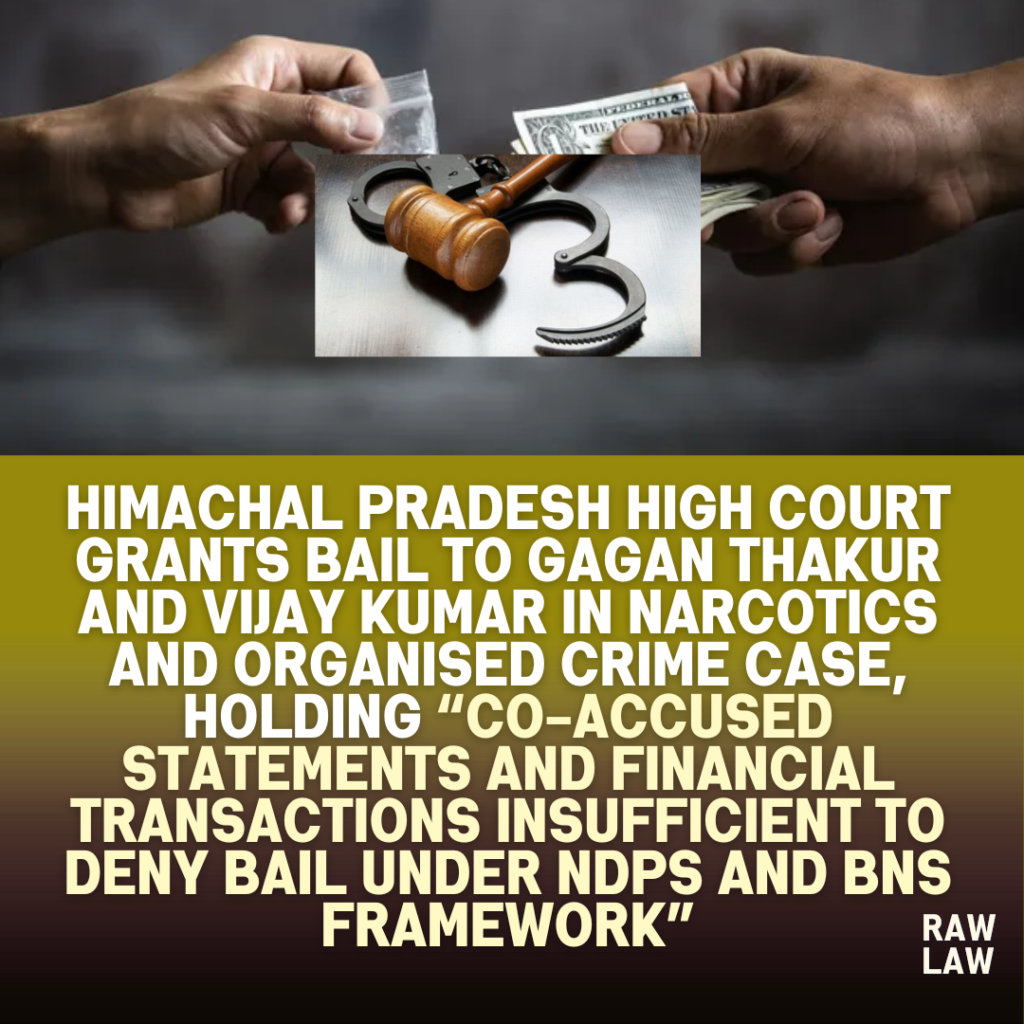Court’s Decision
The Himachal Pradesh High Court granted regular bail to the petitioners Gagan Thakur and Vijay Kumar, who were arrested under Sections 21, 27A, and 29 of the NDPS Act and Section 111 of the BNS. The Court held that statements of co-accused, call detail records, and financial transactions alone are insufficient to deny bail under the stringent bail provisions of the NDPS Act when no prima facie evidence connects the accused with the offence, and their further detention was unjustified.
Facts
The case arose from an FIR registered after the seizure of 26.68 grams of heroin from co-accused Sohan Lal and Geeta Sreshta. Investigation revealed large financial transactions in the accounts of Sohan Lal, allegedly proceeds from drug sales, with transactions traced to multiple individuals, including the petitioners. Both petitioners were arrested on allegations of having transferred amounts to Sohan Lal and others, asserting their involvement in an organised drug syndicate.
Issues
- Whether co-accused statements and call detail records are sufficient for continued detention under NDPS Act’s stringent bail provisions.
- Whether Section 27A NDPS Act was applicable based solely on financial transactions.
- Whether Section 111 of the BNS (Organised Crime) was attracted in the absence of multiple charge sheets and legally admissible evidence.
Petitioner’s Arguments
The petitioners argued:
- They were falsely implicated based solely on financial transactions and call records.
- No direct recovery of contraband was made from them.
- Under Tofan Singh v. State of Tamil Nadu and Dipakbhai Jagdishchandra Patel v. State of Gujarat, statements of co-accused are inadmissible.
- Financial transactions alone do not establish intent to finance drug operations under Section 27A NDPS Act.
- No charge sheets existed against them within the preceding ten years to invoke Section 111 BNS.
Respondent’s Arguments
The State contended:
- Petitioners were part of an organised crime syndicate and financed the drug trade, evident from financial transactions.
- Their release could hamper the investigation and the larger public interest.
- Stringent bail conditions under the NDPS Act applied due to the gravity of offences.
Analysis of the Law
The Court analysed:
- Tofan Singh and Surinder Kumar Khanna on inadmissibility of co-accused statements.
- Rhea Chakraborty v. Union of India clarifying the meaning of “financing” under Section 27A NDPS Act.
- Mohd. Hashim v. State of Kerala and State of Maharashtra v. Shivaji Ramaji Sonawane on requirements for invoking organised crime laws, emphasising the need for multiple charge sheets within ten years and active unlawful activities.
Precedent Analysis
Key cases referred:
- Tofan Singh v. State of Tamil Nadu (2021): Co-accused confessions to police inadmissible.
- Dipakbhai Jagdishchandra Patel v. State of Gujarat (2019): Co-accused statements under Section 161 CrPC inadmissible.
- Rhea Chakraborty v. Union of India (2021): Financing under Section 27A requires more than mere transactions.
- Mohd. Hashim v. State of Kerala (2024): Section 111 BNS applicability requires charge sheets and active unlawful activities.
- Saina Devi v. State of Himachal Pradesh (2022): CDRs and co-accused statements insufficient to deny bail under NDPS.
Court’s Reasoning
The Court held:
- Statements of co-accused are inadmissible and cannot form the sole basis for denying bail.
- Financial transactions without clear linkage to narcotics trade or evidence of “financing” as defined under Section 27A NDPS Act do not justify custody.
- Section 111 BNS could not apply as no prior charge sheets existed against the petitioners within the past ten years.
- Bail conditions must balance liberty with public interest, and in the absence of prima facie evidence, continued detention was unjustified.
Conclusion
The Himachal Pradesh High Court:
- Allowed the bail petitions of Gagan Thakur and Vijay Kumar.
- Directed their release on furnishing bail bonds of ₹1,00,000 each with surety.
- Imposed conditions requiring cooperation with investigations and non-tampering with evidence during bail.
Implications
- Reaffirms that co-accused statements and CDRs alone cannot justify bail denial under the NDPS Act.
- Clarifies “financing” under Section 27A requires evidence of facilitating or sustaining illicit trade, not mere transactions.
- Sets precedent on the strict applicability of Section 111 BNS, requiring charge sheets and active organised crime links before invocation.
Short Note on Cases Referred
- Tofan Singh: Co-accused confessions inadmissible.
- Dipakbhai Jagdishchandra Patel: Section 161 statements inadmissible.
- Rhea Chakraborty: Financing requires facilitating illicit trade.
- Mohd. Hashim: Section 111 BNS requires multiple charge sheets.
- Saina Devi: CDRs and co-accused statements insufficient for bail denial.
FAQs
1. Can financial transactions alone justify the denial of bail under NDPS Act?
No, transactions alone, without clear evidence of financing illicit trade, are insufficient to deny bail under NDPS.
2. Is a co-accused’s confession to the police admissible against another accused in NDPS cases?
No, such confessions are inadmissible under the Indian Evidence Act and cannot be used to deny bail.
3. What conditions are necessary to invoke Section 111 BNS for organised crime?
There must be at least two charge sheets within ten years and evidence of continuing unlawful activities by the accused.



